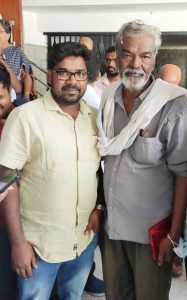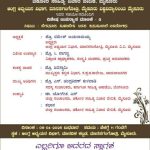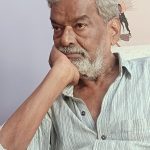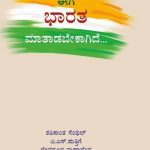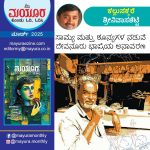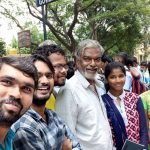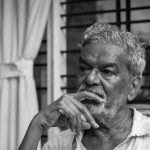Vaikom Award to Kannada writer and activist Devanoor Mahadeva is historic-V.L.Narasimhamurthy
(An Article by VL Narasimhamurthy published in ‘Ambedkar Vada’ December 2024, translated into English by Anisha Shet and published on The News Minute web portal on 23 December 2024. Article edited by Bindu Karunakaran. 2024 ಡಿಸೆಂಬರ್ ತಿಂಗಳ ‘ಅಂಬೇಡ್ಕರ್ ವಾದ’ ಪತ್ರಿಕೆಯಲ್ಲಿ ಪ್ರಕಟವಾಗಿದ್ದ ವಿ.ಎಲ್.ನರಸಿಂಹಮೂರ್ತಿ ಅವರ ಬರಹವು, ಅನಿಷಾ ಶೇಟ್ ಅವರಿಂದ ಇಂಗ್ಲಿಷ್ ಗೆ ಅನುವಾದಗೊಂಡು 23 ಡಿಸೆಂಬರ್ 2024ರಂದು ದಿ ನ್ಯೂಸ್ ಮಿನಿಟ್ ವೆಬ್ ಪೋರ್ಟಲ್ ನಲ್ಲಿ ಪ್ರಕಟವಾಗಿದೆ. ಬಿಂದು ಕರುಣಾಕರನ್ ಅವರು ಲೇಖನವನ್ನು ಸಂಪಾದಿಸಿದ್ದಾರೆ.)
https://www.thenewsminute.com/karnataka/vaikom-award-to-kannada-writer-and-activist-devanoor-mahadeva-is-historic?fbclid=IwZXh0bgNhZW0CMTEAAR2RGHk4G7-b_2X-narOqAkGGdY28t7dWmq8MmxhKFlXY_3Bcqt8-I-Ul94_aem_h-yNEw6WieMD1yOe0TEUwQ
In the name of preserving the temple’s ‘purity’, four major roads leading to the Sri Mahadeva Temple in Vaikom were closed to Dalits, and the marginalised Ezhava community. In 1924, Congress leaders of Vaikom launched a satyagraha against this untouchability which was being practiced in the garb of ‘madi-mailige’ (purity-pollution). As the struggle intensified, the government arrested and imprisoned the activists under pressure from the dominant castes. At this point, Periyar EV Ramasamy Naicker, the president of the Tamil Nadu Congress, came to Vaikom and took charge of the movement. This satyagraha, which lasted over 600 days, drew national attention due to MK Gandhi’s involvement. In the end, with Gandhi’s intervention, an agreement was reached: three of the four roads leading to the temple would be opened to the public, while one would remain closed.
However, this agreement was not acceptable to Periyar and as a result, he quit the Congress, withdrew from Gandhian satyagraha and launched the self-respect movement in Tamil Nadu. Later, speaking about the Vaikom Satyagraha at Nippani in Belgaum (as it was then known), Babasaheb Ambedkar expressed his disappointment with Gandhi’s and the Congress’ positions on untouchability and annihilation of caste.
The Vaikom Satyagraha, which led to many significant debates, played a vital role in the public lives of both Periyar and Ambedkar. Periyar, who built a strong ideological movement in Tamil Nadu, organised struggles to allow temple access in several places, while Babasaheb led various movements such as the Mahad Satyagraha and the Kalaram Temple entry struggle. Both of them demonstrated that denying access to public spaces and the use of common resources on the basis of caste were a denial of civil rights. The ideals of equality from these struggles have been enshrined in the Constitution of India.
This is the 100th anniversary of the Vaikom Satyagraha which became a catalyst for social change and various social movements in the 20th century. The Tamil Nadu and Kerala governments have jointly celebrated this milestone. In honour of Periyar’s contribution to the Vaikom Satyagraha, the Tamil Nadu government instituted the Vaikom Award, which it awarded to Devanoor Mahadeva, who has made significant contributions to the struggle for social justice. Thus, on the centenary of the Vaikom Satyagraha, a significant milestone has been achieved.
Devanoor Mahadeva is not only one of the greatest creative writers of this country but is also a key figure in realising the aspirations of both Periyar and Ambedkar and among those who built a post-Ambedkar Dalit movement to take their struggle forward.
No history of the major movements of Karnataka of the 1970s, whether it is the socialist and rationalist movements, the Boosa and the Dalit movements, or the Bandaya Sahitya organisations, can be written without mentioning him.
Periyar’s ideological movement in Tamil Nadu inspired the rationalist movement in Karnataka, with Periyar himself visiting Karnataka. Similarly, Babasaheb was a huge inspiration for the birth of the Dalit movement. Devanoor along with Professor B Krishnappa led the Dalit movement in Karnataka and helped make the Dalit Sangharsha Samiti (DSS) a voice for marginalized communities.
Despite being one of Kannada’s great celebrated writers and one of the tallest leaders of the Dalit movement, Devanoor stands out due to his disposition. His reserved nature, desire for solitude, his quality of speaking his mind without caring for the political correctness which one sees in other intellectuals, and his moral integrity which has never bowed before circumstance, have made him a great cultural figure in the Kannada world. Even though he had plenty of opportunities to comment, he spoke little and continued to write creative literature. But both his ideas and his writing have enormous consequences.
In the wake of the Dalit movement, Devanoor thought that it was important that political movements go along with social movements. He started ‘Sarvodaya Karnataka’ by bringing together various factions of the Dalit and farmer movements, and along with Yogendra Yadav’s Swaraj India, attempted to promote a value-based politics. Notwithstanding the outcomes of these attempts at politics, it appears that Devanoor, angered by the developments of the last 10 years, has become increasingly outspoken, both in speech and writing.
Why did it become necessary for someone like Devanoor to go against his nature, and become increasingly outspoken both in speech and in writing, and even take to the streets? The answer is the increasingly anti-Constitutional acts carried out by communalists across the country and the attempts of the Sangh Parivar, to drag the country back into a time when varnashrama dharma was the law.
Devanoor is speaking out against the attempts being made to kill the Constitution which traditional society perceives as a threat. He has also exposed the chicanery of the Sangh after the BJP came to power. For any pro-people movement – the atrocities on Dalits and Adivasis, the movement against the CAA-NRC, struggles against anti-farmer policies, the reservation for the Economically Weaker Section (EWS) which is fatal to social justice, attacks on minorities – Devanoor’s voice becomes a rallying call. His voice became the voice of society against the BJP government’s attacks on the right to food, education and social justice in Karnataka.
When the nefariousness of Rashtriya Swayamsevak Sangh (RSS) went beyond excessive, he wrote a small booklet “RSS – AaLa Agala” (RSS – It’s depth and scope). Within days of its release, lakhs of people bought the book and read it. The book has been translated into English and other languages and has reached many parts of the country. Even though numerous important books have been written about the RSS’ politics of hatred, the importance Devanoor’s book acquired is due to his stature. The book played a greater role in creating the kind of awareness that political parties and social movements should have created, because people believed that when someone like Devanoor warns of something, danger must be lurking. This is the biggest “cultural revolution” of our time—such is the credibility that Devanoor’s views command.
Babasaheb believed that any struggle for social revolution must be led by people from marginalised communities. One is reminded of this belief of Babasaheb’s when one considers the importance given to Devanoor’s views in Karnataka’s social movements and cultural sphere today. Perhaps, after Kuvempu, Devanoor has emerged as the cultural leader of Karnataka. As we mark 50 years of the Boosa movement and the Dalit movement, the stature that Devanoor has acquired today is of historical importance.
The Supreme Court’s recent verdict on internal reservations has sparked many debates within the Dalit movement. While the biggest intellectuals of the country sit on the fence, Devanoor’s clear support for internal reservations has not just strengthened the movement for its implementation in Karnataka, but also countrywide.
The wheels of history appear to turn in a fascinating manner. The Vaikom Satyagraha a hundred years ago was about opening the temple roads to all. However, believers of the Vedas who breathed the values of inequality, waved the Manusmriti as evidence and argued in front of Gandhi. It was with this mind that Babasaheb gave the call to burn these scriptures. And he burned the Manusmriti too, during the Mahad Satyagraha. In place of the Manusmriti, Babasaheb gave us the Constitution. It is on the very land of Vaikom that Devanoor Mahadeva, who has fought for the ideals of the Constitution throughout his life, was bestowed the honour of the century.
That Devanoor was honoured on the very land that Dalits were prohibited from walking on, is a matter of celebration and pride for every individual who dreams of equality.
[VL Narasimhamurthy is a Bengaluru-based writer and Dalit activist.
Translated from Kannada by Anisha Sheth.]
